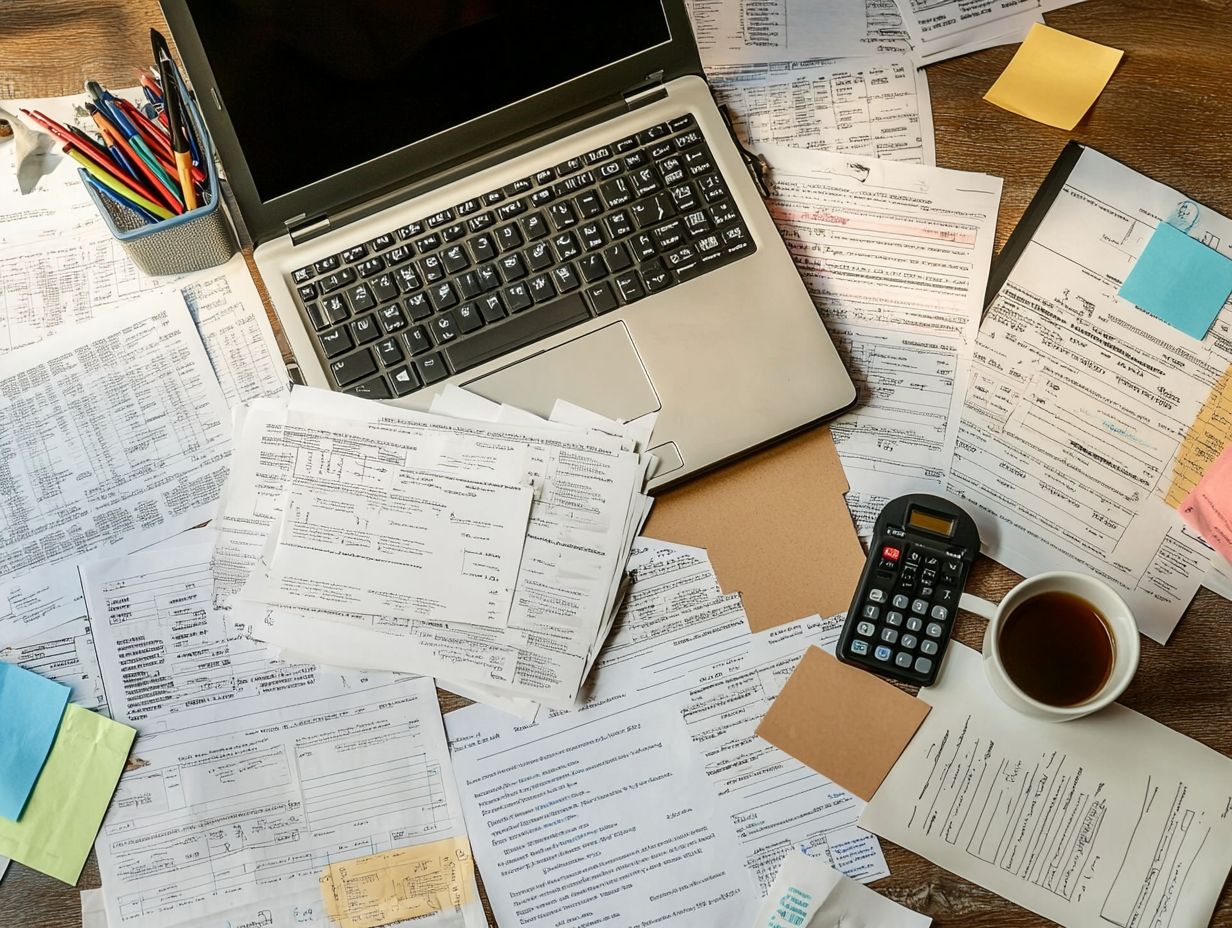The Importance of Keeping Tax Records for Freelancers
Navigating the freelance world presents unique challenges. Managing tax records ranks high among the most critical yet often overlooked aspects, especially for freelance professionals.
Understanding the significance of tax records can profoundly impact your financial well-being. This article will help you discover the essential tax documents every freelancer must have, including income records, expense documentation, and important receipts and invoices.
We will discuss effective organizing strategies and tips to sidestep common pitfalls. Don t let tax season catch you off guard! Mastering your records can save you time and money.
Contents
- Key Takeaways:
- Types of Tax Records for Freelancers
- Organizing and Managing Tax Records
- Benefits of Keeping Tax Records
- Tips for Freelancers on Tax Record-Keeping
- Frequently Asked Questions
- What is the importance of keeping tax records for freelancers, particularly for tax compliance?
- What types of records should freelancers keep for tax purposes?
- How long should freelancers keep their tax records?
- What are the consequences of not keeping tax records as a freelancer?
- How can organizing tax records benefit freelancers?
- Are there any tools or software that can help freelancers with keeping tax records?
Key Takeaways:

- Accurate and organized tax records are essential for freelancers to report income and expenses correctly, maximize tax deductions, and avoid penalties and audits.
- Freelancers should keep detailed records of income, expenses, receipts, and invoices to report earnings and claim deductions for business-related expenses.
- Effective record-keeping strategies and tools can help freelancers stay organized and save time managing their tax records.
Why are Tax Records Important?
Tax records are essential for ensuring financial clarity in your freelance endeavors. They help you stay compliant with tax regulations and serve as crucial supporting documents during audits or when claiming tax deductions.
Proper management of these records can greatly influence your ability to track gross income, manage cash flow, and prepare for estimated tax payments. For freelancers, understanding taxable income is essential. In short, keeping organized tax records is fundamental for maintaining sustainable business operations.
Accurate and comprehensive tax records are vital for fulfilling your tax obligations and providing valuable insights into your overall financial health. These documents lay the groundwork for effective record-keeping, allowing you to easily assess your financial performance over time. Additionally, knowing how to save for taxes as a freelancer can further enhance your financial strategy.
By consistently maintaining your tax-related information, you mitigate the risks associated with potential audits or filing discrepancies. This diligence ensures legal compliance and enhances your decision-making process, giving you the power to strategize for future growth while minimizing unexpected tax liabilities.
Types of Tax Records for Freelancers
As a freelancer, it s essential to maintain a comprehensive array of tax records to ensure precise reporting and compliance. This includes meticulous income records, thorough expense documentation, and organized receipts.
By understanding the specific types of tax records required, you can navigate your financial obligations and optimize your tax strategies for maximum benefit.
Income Records
Income records are critical for freelancers, offering a detailed overview of all income sources, which is vital for the taxes freelancers pay on their earnings.
Maintaining accurate income records significantly influences your gross income reporting and your eligibility for various tax deductions. Effective tracking methods like intuitive bookkeeping software and meticulous accounting journals can simplify the entire process. This approach organizes your income data easily and helps you uncover potential tax-deductible expenses that could slip through the cracks.
By capturing every financial detail, you can optimize your tax returns, ultimately bolstering your financial health and supporting the long-term sustainability of your business.
In conclusion, keeping organized tax records is not just about compliance; it’s about empowering you to make informed decisions that benefit your freelance career.
Expense Records
Keeping accurate expense records is crucial for freelancers. These records help you find deductible expenses, reducing your taxable income and keeping you compliant with IRS rules.
Understanding the various types of deductible expenses like home office costs, equipment purchases, and business travel can make a considerable difference in your overall financial health. By keeping an eye on software subscriptions and professional fees, you can optimize your tax strategies effectively.
Good expense management not only helps maximize your deductions but also plays a vital role in stabilizing your cash flow.
By systematically categorizing and documenting these expenditures, you gain valuable insights into your spending patterns. This leads to improved budgeting practices and informed financial decisions, ultimately fostering growth and sustainability in your freelance endeavors.
Receipts and Invoices

Receipts and invoices are critical elements of your tax records as a freelancer. They act as essential proof of both your expenses and income.
These documents become your allies during tax filing or audits, providing the necessary support for your financial documentation. Managing these documents effectively can make tax season less stressful.
By systematically organizing your receipts and invoices, you ll gain a clearer understanding of your financial landscape. This makes it easier to analyze income fluctuations and monitor expenses.
Keeping your records accurate and well-organized not only helps you maximize potential tax deductions but also streamlines your bookkeeping tasks throughout the year. By consistently categorizing these documents, you ensure compliance with your tax obligations while gaining valuable insights during financial analysis, ultimately empowering you to make more informed business decisions. To further protect yourself, it’s important to know how to handle tax audits as a freelancer.
Organizing and Managing Tax Records
Organizing and managing tax records with precision is crucial for freelancers aiming to maintain financial clarity. This careful planning streamlines processes for audits and tax filing.
It sets a solid foundation for your financial health. By leveraging modern bookkeeping software, you can significantly elevate your recordkeeping strategies, minimizing the risk of errors or mishaps.
Effective Record-Keeping Strategies
Implementing effective record-keeping strategies is essential for you as a freelancer. It helps you manage your tax records efficiently and maintain compliance with IRS regulations.
This practice enhances your overall financial management and fuels your business growth. By utilizing various organizational systems, you can streamline this process significantly.
Ensuring that important documents are readily accessible when necessary is vital. Leveraging financial tools such as accounting software or apps will allow you to automatically track income and expenses, categorize transactions, and generate insightful reports about your financial health.
Establishing a consistent schedule for updating your records can alleviate the stress often tied to tax season. Regular audits of these records not only strengthen your tax compliance, but also empower you to make informed decisions that positively influence your business trajectory. For creative freelancers, following essential tax tips can further enhance your financial management.
Benefits of Keeping Tax Records
Maintaining comprehensive tax records offers a wealth of advantages for freelancers. It empowers you to maximize deductions, sidestep penalties, and foster overall financial stability.
With precise record-keeping, you can navigate your tax obligations with confidence. Use your financial documentation as a vital tool for strategic decision-making.
This proactive approach not only streamlines your tax process but also positions you for greater financial success.
Maximize Your Tax Savings!
Maximizing deductions is an essential financial strategy for freelancers. It allows you to reduce your taxable income and keep more money in your pocket by carefully keeping track of your deductible expenses throughout the year.
By regularly reviewing your receipts, invoices, and other money records, you can uncover potential deductions that might slip through the cracks. This proactive approach helps you track your expenses effectively and ensures you stay compliant with tax regulations, or the rules about how to report income and expenses. Additionally, understanding what to know about sales tax as a freelancer can ultimately bolster your financial stability.
Engaging in financial analysis gives you the power to assess your unique spending patterns, enabling informed decisions about what qualifies as a necessary business expense. Seek professional advice to uncover lesser-known tax-saving opportunities that align with current tax laws, enhancing your overall financial strategy.
Avoiding Penalties and Audits

Avoiding penalties and audits is crucial for freelancers. Failing to comply with tax regulations can lead to significant financial consequences and jeopardize business stability.
To manage your taxes effectively, embrace strategies that prioritize accurate bookkeeping and tax filing.
Maintaining meticulous money records helps you track expenses and income while ensuring transparency in your earnings, significantly reducing discrepancies that can trigger audits.
Set reminders for tax deadlines to stay on top of your obligations, allowing for proactive engagement with tax forms. By establishing a clear financial strategy, you can minimize errors, avoid penalties, and maintain compliance fostering a more stable business environment.
Tips for Freelancers on Tax Record-Keeping
You can significantly enhance your freelancing experience by adopting effective tax record-keeping practices. These practices not only streamline your financial processes but also help you avoid common bookkeeping pitfalls that could result in expensive mistakes.
Common Mistakes to Avoid
Recognizing common bookkeeping mistakes is crucial for freelancers seeking tax compliance and financial clarity. These missteps can lead to significant issues down the line.
Freelancers often underestimate the importance of consistent record-keeping, which can spiral into chaos come tax season. Many individuals mix personal and business expenses, complicating the identification of deductible items. Failing to track income properly can lead to underreporting, resulting in costly penalties. Additionally, neglecting to reconcile accounts regularly can create discrepancies that accumulate over time. To avoid these pitfalls, it’s crucial to keep essential tax documents organized and accessible.
By leveraging financial tools like accounting software and establishing organizational systems, freelancers can streamline their bookkeeping processes. This structured approach simplifies tax planning tips for new freelancers and promotes overall financial well-being.
Tools and Resources for Organizing Records
Utilizing the right tools and resources for organizing your tax records is essential as a freelancer. Effective bookkeeping software, such as QuickBooks and Xero, can streamline tracking your income and expenses.
Beyond these popular options, consider platforms like FreshBooks and Wave, which offer user-friendly interfaces tailored to the unique needs of independent professionals. These tools simplify invoicing and enhance expense categorization, allowing you to prepare for tax season quickly and accurately.
Many of these solutions include cloud storage features, ensuring that your financial documents are accessible from anywhere, minimizing the risk of loss or disorganization.
With integrated reporting capabilities, you can gain valuable insights into your financial health, giving you the power to make informed decisions and strategies for future growth.
Frequently Asked Questions
What is the importance of keeping tax records for freelancers, particularly for tax compliance?

Freelancers need organized tax records. They help manage finances and ensure accurate tax filing, preventing potential legal issues with the government.
What types of records should freelancers keep for tax purposes?
Freelancers should keep records of all income, expenses, receipts, invoices, and any other relevant financial documents. They must also track any tax forms received, such as 1099s tax forms freelancers often get that show income earned from clients and any deductions they plan to claim.
How long should freelancers keep their tax records?
The IRS recommends keeping tax records for at least three years. However, aim to keep your records for six years or more for peace of mind, especially in case of an audit. Some states may have different requirements, so check with your state’s tax agency.
What are the consequences of not keeping tax records as a freelancer?
If you don’t keep accurate tax records, you risk facing penalties, fines, and even legal action from the IRS. You might also miss out on claiming tax deductions and overpay on your taxes.
How can organizing tax records benefit freelancers?
Organizing tax records saves freelancers time and stress when filing taxes. It provides a clear picture of business finances, aiding in budgeting, forecasting, and making important financial decisions.
Are there any tools or software that can help freelancers with keeping tax records?
Yes! Many tools and software are designed specifically for freelancers to track tax records. Popular options include QuickBooks, FreshBooks, and Wave Accounting. These tools assist with invoicing, expense tracking, and tax preparation.






